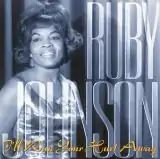Ruby Johnson | |
|---|---|
 Cover of Ruby Johnson compilation album | |
| Background information | |
| Birth name | Ruby Johnson |
| Born | April 19, 1936 Elizabeth City, North Carolina, United States |
| Died | July 4, 1999 (aged 63) Lanham, Maryland, United States |
| Genres | R&B, soul |
| Occupation(s) | Singer |
| Years active | c.1958–1974 |
| Labels | V-Tone, NEBS, Volt |
Ruby Johnson (April 19, 1936[1] – July 4, 1999)[2] was an American soul singer, best known for her recordings on the Volt label in the late 1960s.[1]
Life and career
She was born in Elizabeth City, North Carolina, and was raised in the Jewish faith.[2] She sang, with her eight brothers and sisters, in the Temple Beth-El choir.[1] After completing high school, she moved to Virginia Beach where she worked as a waitress and began singing rhythm and blues with local bands, before spending two years with Samuel Latham and the Rhythm Makers.[1] She then moved to Washington, D.C. in the late 1950s, and joined Ambrose and the Showstoppers, the house band at the Spa nightclub.[1] Local entrepreneur Never Duncan Jnr. became her manager,[1] and placed her with record producer Dicky Williams. Her first single, "Calling All Boys", was issued in 1960 on the V-Tone label, before Duncan established his own recording company, NEBS.[1] She released a succession of singles on NEBS, including "Here I Go Again", "Worried Mind", and "Nobody Cares", some of which became local hits.[2]
When her local supporter, disc jockey Al Bell, began working for Stax Records in Memphis in 1965, he won her a contract with the label.[1] There, she recorded a handful of classic soul records with the writing and production team of Isaac Hayes and David Porter,[1] and backing musicians including Steve Cropper, "Duck" Dunn and Al Jackson. These were issued on the Stax subsidiary label, Volt.[1] They included "I'll Run Your Hurt Away",[1] which reached No. 31 on the Billboard R&B chart in 1966, and "If I Ever Needed Love", both tracks which became staples of subsequent soul compilations, such as those by Dave Godin.[3]
Despite the quality of her records, they met with little success, and after a few more years singing in clubs, she gave up her singing career in 1974.[1] She worked in government posts, and eventually became the director of Foster Grandparents, a federal programme helping handicapped children relate to older generations.[1] She also returned to worship and sing at the Temple Beth-El near her home in Lanham, Maryland. A compilation CD, including many previously unissued tracks, was issued in 1993.[4]
She died in 1999, aged 63.[2]
Discography
Singles
- 1961 "Callin' All Boys" / "Pleadin' Heart" – V-TONE 222
- 1963 "I Received Your Message" / "Stop Wasting Your Tears" – Pledge 108
- 1964 "Worried Mind" / "I'm Hooked" – NEBS 502
- 1964 "What Goes Up Must Come Down" / "I Want A Real Man" – NEBS 503
- 1965 "Let Me Apologise" / "Don't Start Nothing" – NEBS 101
- 1965 "Here I Go Again" / "Jerk Shout" – NEBS 501
- 1966 "I'll Run Your Hurt Away" / "Weak Spot" – Volt 133
- 1966 "Come To Me My Darling" / "When My Love Comes Down" – Volt 140
- 1967 "Reach Out and Touch Me" / "Come Back To Me" – NEBS 508
- 1967 "If I Ever Needed Love (I Sure Do Need It Now)" / "Keep On Keeping On" – Volt 147
- 1968 "I've Been Hurt (So Many Times)" / "Through Dealing" – NEBS 509
- 1968 "Why You Want To Leave Me" / "I Can't Do It" – NEBS 511
- 1969 "Nobody Care" / "Why Do You Want To Leave Me" – NEBS 600[5]
Albums
I'll Run Your Hurt Away, Stax, 1993[4]
References
- 1 2 3 4 5 6 7 8 9 10 11 12 13 Colin Larkin, ed. (1993). The Guinness Who's Who of Soul Music (First ed.). Guinness Publishing. p. 143. ISBN 0-85112-733-9.
- 1 2 3 4 "Obituary: Ruby Johnson". The Independent. October 23, 2011. Retrieved July 8, 2021.
- ↑ "RUBY JOHNSON : Sir Shambling's Deep Soul Heaven". Sirshambling.com. Retrieved July 8, 2021.
- 1 2 "I'll Run Your Hurt Away - Ruby Johnson | Songs, Reviews, Credits". AllMusic. Retrieved July 8, 2021.
- ↑ "Ruby Johnson Discography - USA". 45cat.com. Retrieved July 8, 2021.